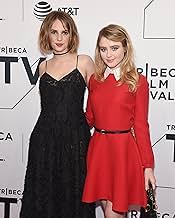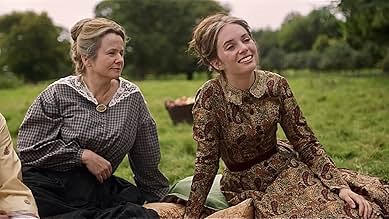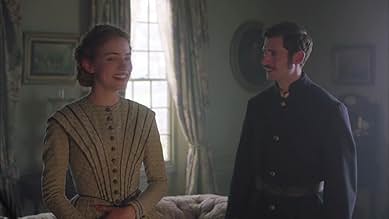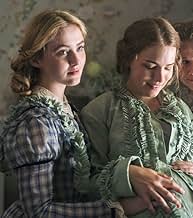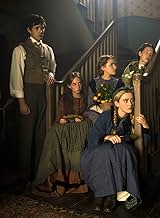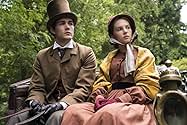Dramatization of Louisa May Alcott's novel about the lives of the four March sisters during the American Civil War as they learn to navigate love, loss, and the trials of growing up.Dramatization of Louisa May Alcott's novel about the lives of the four March sisters during the American Civil War as they learn to navigate love, loss, and the trials of growing up.Dramatization of Louisa May Alcott's novel about the lives of the four March sisters during the American Civil War as they learn to navigate love, loss, and the trials of growing up.
- Awards
- 3 wins & 7 nominations
Browse episodes
Storyline
Did you know
- TriviaDirector Vanessa Caswill expanded on the idea that historical accuracy and period authenticity was paramount. "We asked them to grow their underarm hair, because that would have been authentic, and not to have visible make-up because they wouldn't have worn any," she says. (Little Women Production Notes)
- GoofsIf Jo is old enough to attend an evening party, she would not be wearing her hair in a long braid, but up in the severe, center-parted styles of the period. Being old enough to put one's hair up and go to parties was an important rite of passage into adulthood, and even someone as unconventional as Jo would not have attended a social function with her hair down.
- ConnectionsFeatured in The South Bank Show: Heidi Thomas (2019)
Featured review
Unlike many classic adaptations the BBC has released in the past, problem after problem weighs down Little Women and stops the series from being a truly enjoyable watch.
The book itself is largely written in a sweet, innocent voice/tone, and it works well within the text. However, when translating or trying to capture that same voice or spirit in actual dialogue for the screen, it comes off as amateurish or overly sentimental when spoken aloud. The text's tone is actually one of the reasons why this book is difficult to adapt. It is not the acting that lets the series down, rather it is the words that are unbelievable. People simply don't/didn't speak in such a way, even in the Victorian period. If this version is trying to modernize the girl's characters/eccentricities and the story's main message, why could it not modernize the language a bit or be a little more age appropriate- of course, still keeping it in line with the book's tone. An adaptation of Little Women should strike a balance between the two parts of the girls' and Laurie's journey into adulthood. First, establishing the way things are and have always been in the March home in a playful tone, and then, as they are forced to change through the circumstances of life and love, the tone becomes more heartwarming and more mature. From the get-go, this version applies a serious and mature tone despite the language used and the children's level of maturity, so, there is never a real transformation in character/perspective for any of the children, only in the circumstances they find themselves in.
Another glaring problem is the editing and structuring of the plot. Simply put, many scenes are too short; the scenes are like snapshots; they tell the basic story from a surface, visual level, but it lacks any depth, detail, or real explanation. This version misses the opportunity, being that it is longer and has more time, to include parts that have been left out of adaptations before it- parts that develop or establish the characters, their relationships, and their motives (examples, Jo visiting Laurie when ill, meeting Mr. Lawrence, Laurie's backstory and mother, the girls engaging in Jo's plays, Laurie joining in). Actually, this version excludes more than it adds, which is a little baffling. How can so much be glossed over?
The last problem is the accompanying score. If I am not mistaken, the music used within the series seems to be lifted from or inspired by the Radio 4 play of Little Women. Which is an odd choice, being that it is not of the period. Adding a modern score can work, but here, it is a miss-match.
Though the 94 film has its faults as well, it remains the best crack at adapting Alcott's work, which is disappointing seeing that the BBC had so much potential.
The book itself is largely written in a sweet, innocent voice/tone, and it works well within the text. However, when translating or trying to capture that same voice or spirit in actual dialogue for the screen, it comes off as amateurish or overly sentimental when spoken aloud. The text's tone is actually one of the reasons why this book is difficult to adapt. It is not the acting that lets the series down, rather it is the words that are unbelievable. People simply don't/didn't speak in such a way, even in the Victorian period. If this version is trying to modernize the girl's characters/eccentricities and the story's main message, why could it not modernize the language a bit or be a little more age appropriate- of course, still keeping it in line with the book's tone. An adaptation of Little Women should strike a balance between the two parts of the girls' and Laurie's journey into adulthood. First, establishing the way things are and have always been in the March home in a playful tone, and then, as they are forced to change through the circumstances of life and love, the tone becomes more heartwarming and more mature. From the get-go, this version applies a serious and mature tone despite the language used and the children's level of maturity, so, there is never a real transformation in character/perspective for any of the children, only in the circumstances they find themselves in.
Another glaring problem is the editing and structuring of the plot. Simply put, many scenes are too short; the scenes are like snapshots; they tell the basic story from a surface, visual level, but it lacks any depth, detail, or real explanation. This version misses the opportunity, being that it is longer and has more time, to include parts that have been left out of adaptations before it- parts that develop or establish the characters, their relationships, and their motives (examples, Jo visiting Laurie when ill, meeting Mr. Lawrence, Laurie's backstory and mother, the girls engaging in Jo's plays, Laurie joining in). Actually, this version excludes more than it adds, which is a little baffling. How can so much be glossed over?
The last problem is the accompanying score. If I am not mistaken, the music used within the series seems to be lifted from or inspired by the Radio 4 play of Little Women. Which is an odd choice, being that it is not of the period. Adding a modern score can work, but here, it is a miss-match.
Though the 94 film has its faults as well, it remains the best crack at adapting Alcott's work, which is disappointing seeing that the BBC had so much potential.
- How many seasons does Little Women have?Powered by Alexa
Details
- Release date
- Countries of origin
- Official site
- Language
- Also known as
- Маленькі жінки
- Filming locations
- Production companies
- See more company credits at IMDbPro
Contribute to this page
Suggest an edit or add missing content




